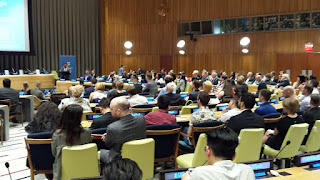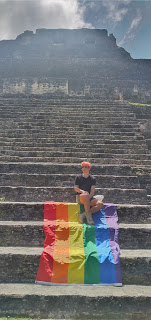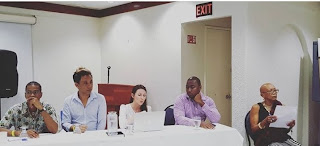Christian and LGBT Groups Brought the Battle for Gay Rights to Caribbean
Reposted June 28th, 2013
Christian and LGBT Groups Have Brought the Battle for Gay Rights to the Caribbean
Controversy over the region's colonial-era "buggery" laws is exposing a new form of advocacy -- and anti-colonialism.
JAVIER CORRALES AND CAMERON COMBS, THE ATLANTICJUN 27 2013, 11:36 AM ET
After
two young men were seen having sexual intercourse in a university
bathroom in Jamaica last year, they were set upon by a mob, who cheered as security guards kicked, punched, and slapped one of the boys. The attack was yet another sign that homophobia is alive and well in many Caribbean nations.
The
West is known for exporting its culture, but also its culture wars. The
fight for gay rights abroad is the latest example. Powerful, U.S.-based
Christian-conservative groups and a network of pro-LGBT transnational
actors have each become deeply involved in debates about homosexuality
in many countries of the Global South.
Today, criminal bans on sodomy still exist in a whopping 78 countries, many holdovers from British colonialism.
These gay "proxy wars" are especially intense in former English
colonies. These territories are inheritors of an acute obsession with
sexual puritanism, which is evident in how their laws treat
homosexuality. Convinced that native societies were morally corrupt and
licentious, colonial governments and pastors prescribed harsh laws
against same-sex relations in British territories. These "buggery"
statues became a colonial mainstay in the 19th century. Originally,
these laws banned any form of "unnatural connection," including
bestiality, but their lasting impact has been the criminalization of
male homosexuality. Today, criminal bans on sodomy still exist in a
whopping 78 countries, many holdovers from British colonialism.
But
200 years later, change is starting to take root. Even in the most
intolerant places, local actors have emerged to revoke these laws.
Needless to say, they face formidable opponents.
International
actors have passionately joined these foreign battles. For supporters
of LGBT rights in the Global North, the myriad injustices that the
world's sexual minorities suffer equate to grave human rights
violations. Some European nations, and now even the U.S. State
Department, have made LGBT-protection an important part of their
objectives abroad.
For
conservative religious organizations, mostly in the United States,
foreign countries represent not just a fresh opportunity to influence
the debate over homosexuality, but also a source of fundraising and
followers. Even before the June 26 Supreme Court rulings on gay marriage
in the United States, these groups recognized that they were losing the
gay-rights debate at home, but they figure that their chances are
better abroad.
The
Anglophone Caribbean is a prominent example of this exported culture
war -- sodomy bans exist in 11 Caribbean nations. Although though these
buggery laws are hardly ever enforced, they give credence to actors who
promote intolerance. From openly homophobic artists to tourist officials
resistant to gay visitors, the English-speaking Caribbean is no gay
paradise.
The
good news is that these laws are no longer taken for granted. In 2011,
the current prime minister of Jamaica campaigned promising to end
buggery laws. On June 25 this year, the Jamaican Supreme Court heard a
complaint against the nation's buggery laws. That case paralleled
another petition to repeal Jamaica's law before the Inter-American
Commission on Human Rights (IACHR). In May, the Belizean Supreme Court tried a
challenge to Section 53 of its criminal code, which condemns "carnal
intercourse against the order of nature" with 10 years in prison. Later
that month, the prime minister of Dominica was compelled to weigh in on
the debate in his own country, asserting that repeal of the sodomy ban
was out of the question for the "foreseeable future." A few days later,
newspapers in Grenada published a letter from the president of the
senate urging a
review of the island's buggery law. Similar legal challenges to sodomy
bans have occurred this year in several other former British colonies -
Singapore, India, and Northern Cyprus.
The
bad news is that these folks are fighting not just local mores, but
also a large battalion of U.S. churches and church-related groups siding
with the defenders of the status quo.
Many
of these small Caribbean nations frequently host Phillip Lee, director
of the California-based religious organization His Way Out Ministries,
which has ties to Focus on the Family. Lee, a man who says he's formerly
gay and has renounced "the lifestyle," preaches that prayer can reverse
same-sex attractions. He has met with high-level officials such as the
governor general of Jamaica and the mayor of Port of Spain, the capital
of Trinidad and Tobago. In his words, "the Caribbean is ripe for ex-gay ministry planting and development." In March of this year, Lee traveled to
Guyana (which he claims to have visited some 20 times) as well as to
Trinidad and Tobago. In both counties, he made several radio and
television appearances,
hosted well-attended workshops, and publically expressed support for
keeping sodomy bans on the books. In Belize, the most prominent advocate
of maintaining the country's buggery law is Scott Stirm, a Texan emigre
and the founder of Belize Action, the main organization opposing the
effort to decriminalize sodomy. AsThe Economist recently reported, Stirm's efforts are buoyed by support from the Alliance Defending Freedom, an Arizona-based religious advocacy organization.
Pro-LGBT
international advocacy groups have sought to contain this crusade.
Their strategy has largely hinged on the inclusion of LGBT issues within
the human rights agenda of multilateral forums, such as the IACHR and
prominent NGOs. AIDS-Free World, based in New York City, filed the
challenges against Jamaica's buggery laws, both before theJamaican Supreme Court and theIACHR. It has also launched a
lawsuit against two Jamaican TV stations and the Corporation for Public
Broadcasting of Jamaica (PBCJ) over their refusal to air a pro-gay PSA,
and is also challenging the travel ban on homosexuals inBelize and Trinidad and Tobago.
In Belize, the Human Dignity Trust, the International Commission of
Jurists, and the Commonwealth Lawyers Association have all joined the
fray as interested parties in support of the complainant. Their
representation includes Lord Peter Goldsmith, former attorney general
for England and Wales.
***
Domestically, these international influences are generating backlash. A
visit to Trinidad and Tobago by Phillip Lee in 2010 provoked, in the
words of the country's most prominent gay rights organization, "the largest (and perhaps the first) GLBT protest in T&T's history." Young
people, galvanized by the harmful effects that reparative therapy has
had on their counterparts in the United States, organized the gatherings
to challenge Lee's "message of exclusion and conversion." One
organizer cited the
elevated rates of suicides among LGBT youth in the United States as
grounds to resist the ex-gay movement in Trinidad and Tobago.
At
the same time, critics of LBGT rights have assumed a hyper-nationalist
position, decrying international LGBT groups for importing their
"foreign models." Advertisements in Belize, for instance, have sought to
portray the case before the country's Supreme Court as an example of
moral decadence being dragged into Belize by Barack Obama (see here, here, or here).
Prior to the arguments before the Supreme Court, protestors in Jamaica
lambasted the buggery case as emblematic of the attempt by gay rights
advocates to "take over the world."
Local
conservative groups have thus turned the debate about gay rights into a
debate against neocolonialism. The paradox is that some of these groups
decry interventionism even though they themselves are welcoming
anti-gay Christian movements from abroad.
International
pro-LGBT rights group thus have perplexing problem on their hands:
helping local actors fight against transnational Christian forces while
at the same time protecting themselves from accusations of
neocolonialism. It seems that aid from religious groups is not subject
to the same imperialist stigma, not to mention the fact that buggery
laws themselves were imposed on Caribbean societies from outside.
Conditionality
could become one way to fight the status quo. Foreign stakeholders are
beginning to require countries to adopt friendlier gay policies in
exchange for, in this case, tourist dollars or foreign aid. When the
Grenadian president of the senate urged a
review of the anti-sodomy law, a principal reason he gave was that
wealthier nations could impose sanctions on the island as punishment for
not doing so. AIDS-Free world, meanwhile, claims its petition before the IACHR is intended to shame Jamaica, thereby imperiling tourist revenues.
But
these approaches can also be counterproductive. They risk placing local
LGBT populations in an antagonistic position vis-à-vis society, as they
stand to shoulder the blame for sanctions intended to punish homophobic
lawmakers.
Colin
Robinson, executive director of a gay rights organization based in
Trinidad and Tobago, asserts that a model that hinges on international
arbitration rather than domestic action often comes at the "expense of
nurturing local political alliances, of building ownership of GLBT
issues by other sexual rights stakeholders, of developing strategic
power domestically, ... or simply of being politically innovative in
response to local conditions." For example, Jamaica's main LGBT
organization has sought to
stem international boycotts of dancehall music. While this genre has
been marked by virulently homophobic rhetoric in the past, local
activists worry that foreign boycotts unwittingly punish reformed
artists and alienate gay rights activism from an important component of
national culture.
International
pro-LGBT groups could also focus more on on-the-ground objectives -
such as reducing school bullying, homelessness, workplace
discrimination, police and teacher sensitivity training, scholarly
exchanges. Swaying public opinion, which can only be done by domestic
groups, might be better than turning punitive.
In
the end, there is no easy solution. Local pro-LGBT rights groups need
all the help they can get, especially where it is unsafe to be openly
pro-gay, as it is in many parts of the Caribbean, and this alone is an
argument for continued help from abroad.
International
pro-LGBT actors should thus stand ready to help, but being careful not
to create new problems for the very constituencies they are trying to
support. The last thing the LGBT community needs is yet another
pejorative label, in the form of "Made in the USA."
Caribbean Forum for Liberation and Acceptance of Genders and Sexualities (CariFLAGS) Secretariat
cariflagssecretariat@gmail.com • (868)-758-7676 • Colin Robinson, Manager
Eastern Caribbean: unitedandstrongslu@yahoo.com
Source: http://www.theatlantic.com/international/archive/2013/06/christian-and-lgbt-groups-have-brought-the-battle-for-gay-rights-to-the-caribbean/277280/
Source: http://www.theatlantic.com/international/archive/2013/06/christian-and-lgbt-groups-have-brought-the-battle-for-gay-rights-to-the-caribbean/277280/
__._,_.___



Comments
Post a Comment